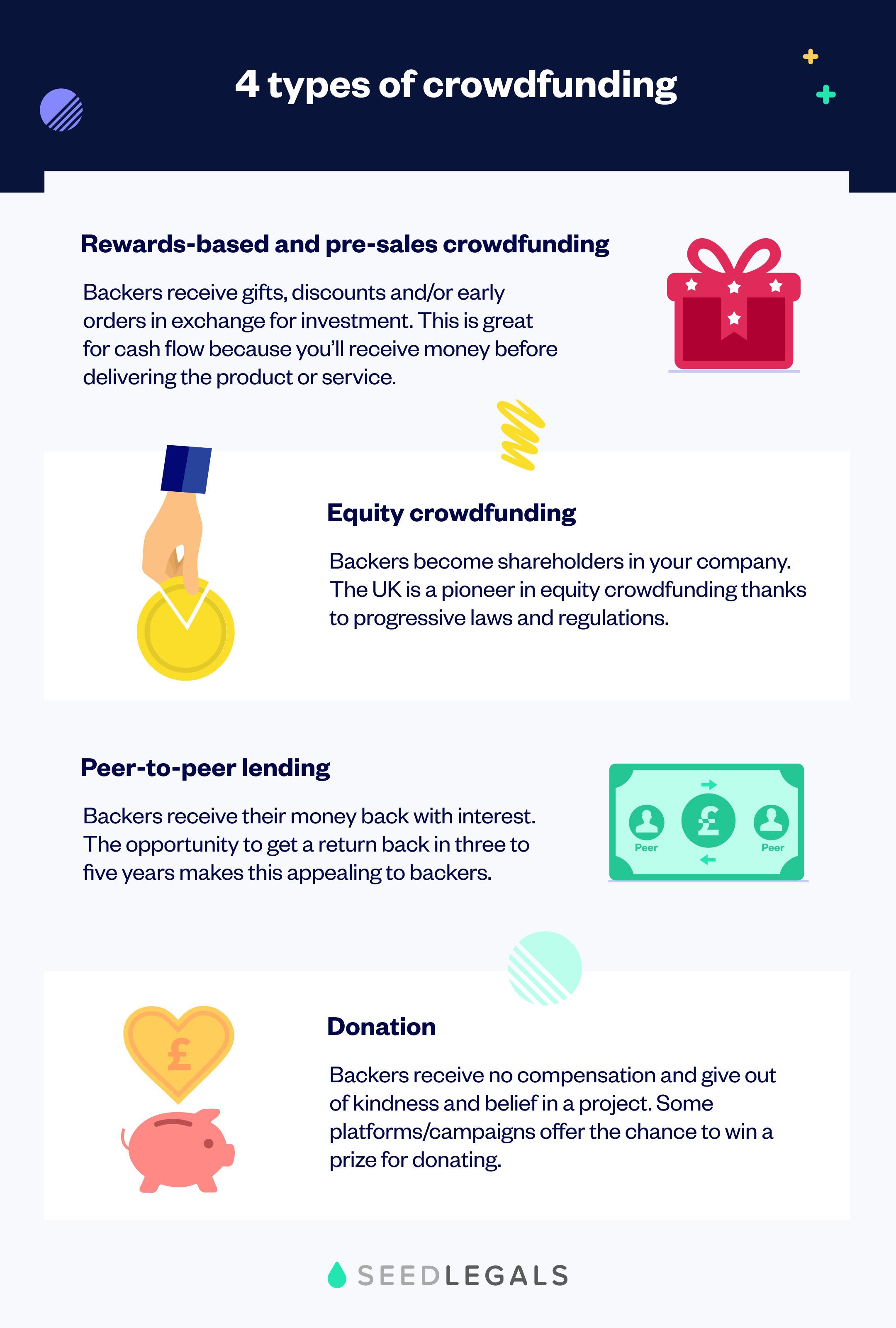Sunbathing or scaling? Founder tips to beat the quiet season
Summers can be slow for startups but Ava Shoraka and Yanki Kizilates are here to help founders gain momentum during thi...
Crowdfunding is one of many ways you can fund your startup. If you’re thinking about running a crowdfunding campaign you need to know how it works and which type of crowdfunding is right for you. In this article, we’ll explain all and recommend the top crowdfunding platforms in the UK to help you get started.
Crowdfunding is a way of raising money from groups of people (usually online) to finance a project or business. Each person contributes a relatively small amount of money but because many people are contributing, it can result in large amounts of funds. The key mechanic behind crowdfunding is that you’ve got to offer your backers (the people giving you money) something in return.
Crowdfunding is used for all sorts of things from helping someone achieve a goal to raising funds for your startup.
Crowdfunding’s been around for hundreds of years. As early as the 1700s a few of the characteristics that make up modern-day crowdfunding were being used. In the literary industry, authors would advertise an idea for a book in a publication and if enough people showed interest the project would go ahead. Although the money was not paid upfront, the concept of testing consumer interest before investing money into an idea had begun its evolution. Loan-based crowdfunding started in Ireland at the same time when Irish loan funds crowdsourced money to lend to low-income families.
In the 20th century, crowdfunding campaigns took place via magazines. A well-known example is The Vegan Society, which funded its documentary Truth or Dairy by placing adverts in magazines in 1992 and collecting cheques from supportive readers. In 1997, British rock band Marillion created an online campaign asking fans for donations so that they could go on tour. They raised US$60,000 for the tour and created more campaigns after that to fund their studio albums.
The first official online crowdfunding platform went live in 2001 and was called ArtistShare. After that came Kiva in 2005, Indiegogo in 2008, Kickstarter in 2009 and GoFundMe in 2010.
The start of crowdfunding for business capital was in 2012 when the platform Fundable was launched to help entrepreneurs grow their businesses.
Each type of crowdfunding has different mechanics. But they all involve fundraisers promoting their venture on a public platform (usually online) to raise money from large groups of people. We call raising a round of capital with crowdfunding a ‘crowd round’.
Crowdfunding platforms charge a fee on the money you raise through them if your campaign is successful. Popular platforms like Seedrs charge 6%-8% of the money you raise, so keep that in mind when you’re working out how much you need to raise.
Founders often come to SeedLegals to secure their cornerstone investors before starting their campaign on a crowdfunding platform. Cornerstone investors are investors who commit to investing a certain amount of money in advance. They’re needed for many equity crowdfunding platforms because those platforms require you to already have investors committed to about 40% of your target amount before you can launch your campaign on the platform. Founders come to SeedLegals for the term sheets and expert SEIS/EIS support needed to secure these investors.
Each country has its own rules and regulations around crowdfunding. In the UK, under Financial Conduct Authority (FCA) regulations, you can only promote equity and loan-based crowdfunding to certain types of investors:
Check out the FCA’s policy on loan-based and investment-based crowdfunding and FCA’s regulatory approach to crowdfunding over the internet for more info.
Jonny SeamanCrowdfunding campaigns are great for many reasons; the marketing reach is excellent, you effectively have people paying to become brand ambassadors for you and can be your biggest champions as you scale. However, do keep in mind that there will be extra time and admin required to manage the crowd during and beyond the investment round. If you’re just starting out you’ll want to consider how a crowdfunding campaign can affect your startup now and in the future. Get clear on your priorities and the pros and cons for your particular business to make sure you’re running a campaign for the right reasons
Funding expert,
There are four types of crowdfunding each with their own pros and cons. You’ll likely need to offer an incentive or reward to attract backers but that may not always be the case.
This is when backers receive gifts, discounts and perks in exchange for investment. You could offer your backers the opportunity to be the first to try your new product or service by pre-selling it. This will also give you the funds upfront to make the product.
How it works
Essentially, you’ll be pre-selling, even before you’ve had to invest in actually producing the product or service. This has the advantage of validating that there is a product-market fit. In the worst-case scenario, it’s a way to fail fast (relatively) cheaply.
As you’ll receive the money before delivering the product or service, this will do wonders for your cash flow.
Unfortunately, long gone are the days when you could upload the project to one of the main platforms and wait for the pledges to arrive. The process involves engaging with an existing community or creating one from scratch, which can be both costly and time-consuming.
A successful rewards-based crowdfunding campaign can give you both the community to run an equity campaign and the credibility to convince investors to come on board.
This is when companies give equity in exchange for backers’ money and they become shareholders in your company. The UK is a pioneer in this type of crowdfunding, thanks to the progressive laws and regulations in this area (especially compared to other countries like the US, Canada and mainland Europe).
How it works
There are two types of equity crowdfunding:
1. Entrepreneur-led
In this case, the platform offers deals to small online investors. The founders set the terms around the deal themselves (such as what the share price is). Platform users (the ‘crowd’) then choose what deals they want to invest in.
2. Investor-led
Platforms that are investor-led only list deals that have been screened by experienced investors who are investing their own money in the deal and negotiating the terms. In this case, the crowd chooses to invest alongside these lead investors.
The most important phase of equity crowdfunding for both is the pre-campaign. For a company raising for the first time, the pre-campaign will usually last a good few months. For your pre-campaign you’ll need to:
When the pre-campaign work is done, you’ll launch your campaign on an equity crowdfunding platform. The most important thing to do during this stage is to stay engaged with potential investors on the platform and spread the word about your campaign through other channels like social media and email marketing.
UK investors will have a clear preference to invest in SEIS/EIS eligible companies, as they will have significant tax benefits. During the pre-campaign, you should apply for advance assurance to demonstrate to investors that your investment will qualify.
You can read more about how equity crowdfunding works in the article How equity crowdfunding works.
This is a form of loan, where backers receive their money back with interest. This means that the company needs to be in a position to repay the credit, which is not often the case in early-stage startups.
For this type of crowdfunding, there is less need to bring a community as the platforms typically attract small lenders happy to support growing companies. What makes it an interesting deal is that the interest received often beats a regular ISA (individual saving account) while offering the same advantages.
In this case, backers receive no compensation and rather donate funds because they believe in a project and just want to support it. This type of crowdfunding is most popular for NGOs, charities, individuals and community projects.
There’s also such a thing as rewards through donation, which is when backers stand a chance to win a prize by donating. It’s like an online raffle where the backer will not receive compensation directly but is buying tickets for a relatively big prize, like an experience with a famous person. An example of a rewards-through-donation platform is Prizeo.
| Advantages | Disadvantages |
| The community you build might support you in an equity campaign in the future | You have to put the time and energy into building and engaging a community |
| It builds credibility for angel investors and venture capitalists | You’re competing with lots of other fundraisers on the platform |
| You build an early adopter customer base and get feedback from them | You have to give stuff away for free |
| Advantages | Disadvantages |
| You build a strong relationship with your customers, who now have some “skin in the game” | In most cases, you’ll bring most of the investment (70%+) yourself via your own investors, friends and family |
| You expose your company to thousands of potential customers & investors via the platform and articles written after the close | Expect the raise to take 4-6 months in total to allow for a proper pre-campaign, a month live, then a few weeks to close it off. Manage your cash flow accordingly or consider agile raising |
| It can be a great way to add an extra few hundred thousand onto a successful investor raise | You’re giving away equity, which leads to some equity dilution |
| Advantages | Disadvantages |
| Backers get to earn a return through interest, which makes you attractive to them | You have debt to repay |
| Interest rates on P2P platforms can be lower than financial institutions | Backers don’t have access to the financial services compensation scheme |
| Backers can benefit from a high return on their investment | It can make you less appealing to venture capitalists and angel investors |
There are lots of good crowdfunding platforms you can use in the UK. Here are some to consider, but for a full list read our article Top 10 crowdfunding platforms for UK startups.
Read more: Top 7 best crowdfunding platforms for startups
It’s worth doing some research to learn and get inspired by some of the awesome crowdfunding campaigns that have happened in the past. Here are five examples:
The founder of Oculus rift, Palmer Lucky, launched a crowdfunding campaign on Kickstarter in 2012 which reached its US$250,000 target in a whopping four hours. Two years later Facebook bought Oculus VR for US$2 billion (£1.7 billion).
This video game campaign was listed in the Guinness World Records after raising US$9 million on Kickstarter and an additional US$40 million on creator Chris Roberts’ website. It’s raised over US$400 million to date.
The most successful campaign on Indiegogo to date, MATE Bikes raised over US$24 million for their foldable eBike product.
Fintech is the darling of equity crowdfunding and this startup was no exception.
Cleantech is another favourite in the equity crowdfunding space, and this Dutch electric scooter manufacturer raised over £3 million on Seedrs.
Want more inspiration? Check out our list of five best crowdfunding videos.
In short – it depends. Crowdfunding tends to fit best with business-to-consumer (B2C) brands and companies that can benefit from the double-bonus of getting investment money and marketing exposure at the same time.
If you’re making a physical product with high initial start-up costs, rewards-based crowdfunding can be a great way to validate the market and collect some pre-sales to build out production.
For venture-backed companies, equity crowdfunding is helpful to add some extra funds into the round and bring on the small-cheque investors. For more established companies with consistent revenue, peer-to-peer lending might work best. Always remember that with more shareholders and customers comes more company admin, but as long as the upsides outweigh that, crowdfunding is definitely something to consider.
If you’re raising money for your startup, SeedLegals can help. Book a call with one of our funding experts and we’ll answer your questions and tell you about the services we offer to make startup fundraising easier.









